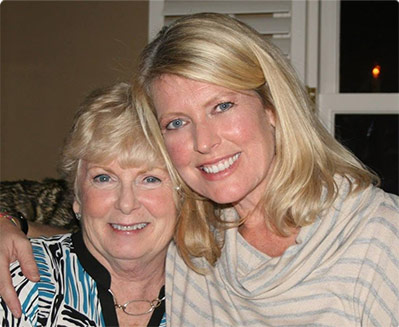
Be a Part of the Fight to End Alzheimer’s
Be a Part of the Fight to End Alzheimer’s
The millions of people impacted by Alzheimer's disease need your help. Your generosity can help us provide care and support to those facing the challenges of Alzheimer's and advance global research. Please make a gift today.
Donate NowMore Women Get Alzheimer’s Than Men. Why?
Researchers Are Pursuing Every Avenue for Answers
Researchers are pursuing every avenue for answers
Editor's note: This article was updated in June 2022.
Of the many mysteries surrounding Alzheimer's, one of the most puzzling is why more women than men develop the disease. In the United States, nearly two-thirds of the more than
6 million people living with Alzheimer's — or nearly 4 million individuals — are women.
For Cassie Jones of Brentwood, Tennessee, this mystery is a very real part of her life. Her maternal grandmother developed Alzheimer's when Cassie was just a small child, and passed away when she was 16. A few years later, Cassie's mother, Jacqueline Holloran, was diagnosed with Alzheimer's.
"My dad told me, 'Mom is having a little trouble with her memory,'" Cassie says. "He wouldn’t even say the word Alzheimer's. But I knew what it meant for her future."
 Cassie's mother passed away in 2006, after a 14-year battle with the disease. And then the unthinkable happened — Cassie's older sister, Suzie, developed Alzheimer's, too.
Cassie's mother passed away in 2006, after a 14-year battle with the disease. And then the unthinkable happened — Cassie's older sister, Suzie, developed Alzheimer's, too.
Sex-specific differences
The impact of Alzheimer's on Cassie's family is devastating, but it's not uncommon. At first, the disproportionate impact of Alzheimer's on women was attributed to age: Women live longer than men, and age is the greatest known risk factor for Alzheimer's. But now, scientists aren't sure it's that simple."It's unclear why this imbalance exists. Longevity has been an explanation, because age is such a strong risk factor for dementia," says Paola Gilsanz, ScD, research scientist, Kaiser Permanente Northern California Division of Research. "But now we see that doesn't explain everything. So we're looking at a variety of factors, including those that are biological and those that are social or cultural."
Women and caregiving
Not only are women more likely to develop Alzheimer's, they’re also more likely to serve as caregivers of people living with the disease.
While more research is needed, this study supports a promising theory: that events that happen across someone's lifespan — like those associated with reproduction — may impact their dementia risk.
"We think it's important to look at the experiences of men and women across their life course, including early, mid and late life, and see how that may impact their dementia risk," Gilsanz says. "This includes experiences that may differ due to sex, and looking at when in the life course they occurred."
Researchers are also investigating sex-specific differences in the architecture of the brain. In a study released at the Alzheimer's Association International Conference® (AAIC®), scientists found that differences in the structural and functional connections of a woman's brain may speed the spread of tau, a protein that clumps into tangles and may contribute to cell damage and, ultimately, cell death. These findings could lead to the creation of risk reduction strategies targeted to women.
Greater risk
Women may be at a greater risk of developing the disease not only because of biological factors, but also as a result of societal or cultural factors. A recent study indicates that work and family patterns, which have changed drastically over the last 100 years, may play a role in a woman's memory decline. Women who participated in the paid labor force between early adulthood and middle age experienced slower memory decline in late life, building on previous research that associates work and education with higher levels of cognitive engagement.Looking to the future
But when it comes to treatment or prevention of Alzheimer's, what do these studies mean for women? And what about men?
Women fight back against Alzheimer's
Women are making their mark in Alzheimer’s and dementia research, supporting current scientists and inspiring future generations.
For women like Cassie Jones, who have seen Alzheimer's ravage their families, this promising research may not yield answers fast enough. But that hasn't stopped Cassie, a mother of two, from becoming a dedicated advocate, volunteer and fundraiser for the Alzheimer's Association. She's looking to the future.
When Cassie's sister started to decline, Cassie's then-14-year-old daughter, Maggie, came to her. Maggie asked if Cassie was going to get Alzheimer's, too.
"I said I didn't know, and she asked, 'Well, what are you going to do about it?'" Cassie says. "And that's really what this is about for me, trying to change the fate of my daughter and the other women in my family."

